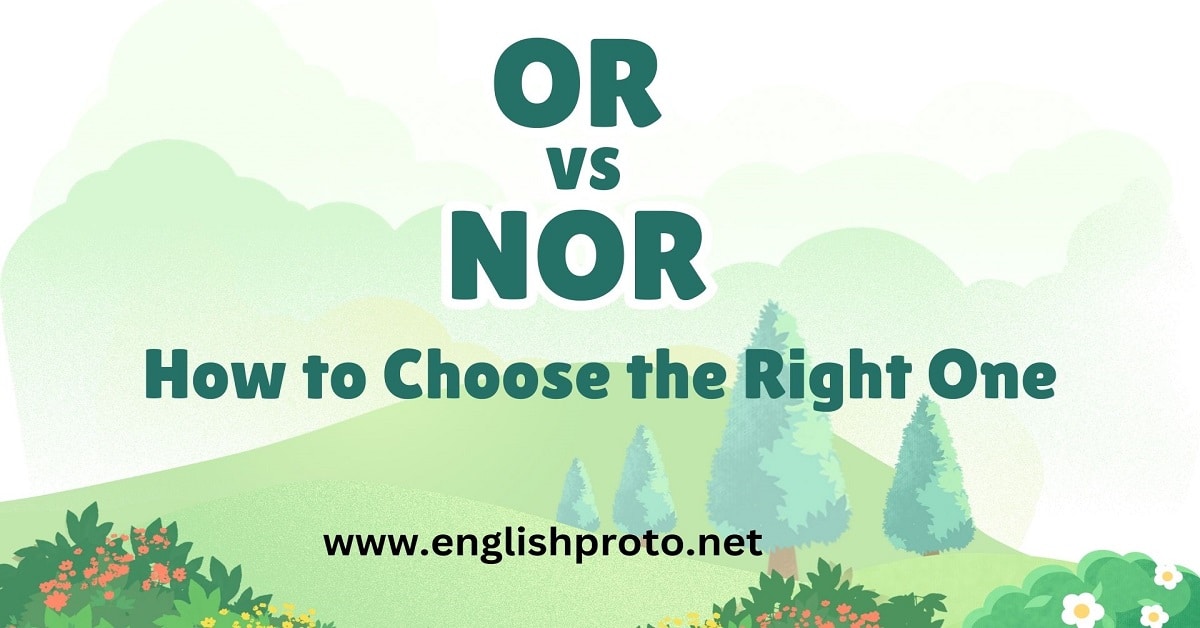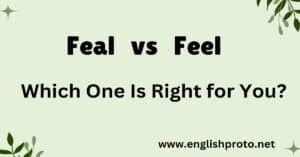Or vs Nor: do you know the difference, or are you guessing? These two tiny words might seem insignificant, but using them incorrectly can completely change the meaning of your sentence.
Whether you’re writing a professional email, crafting a persuasive essay, or just trying to sound polished in casual conversations, mastering “or” and “nor” is key to clear communication.
You’ve probably wondered if you’re using them correctly, don’t worry, you’re not alone! Many people mix these up, but by understanding their distinct roles, you’ll elevate your writing and avoid common mistakes. Stick around, and let’s untangle the confusion together.
Quick Summary
Or and nor are both coordinating conjunctions, but they are used in different contexts:
- Or is used to present options or alternatives, often in positive or neutral sentences.
- Nor is used to present negative alternatives and must often pair with “neither” or follow another negation.
Key Takeaways:
- Use or to connect two or more choices or possibilities.
- Use nor to connect two or more negative options, typically after “neither” or a prior negation.
- “Nor” is less common in everyday speech but remains an essential element of formal writing.
- Remember: “nor” always suggests a continuation of something negative.
Reasons for Confusion: Or vs Nor
The confusion between or and nor arises from their similar functions as conjunctions and their phonetic resemblance. Here are a few common reasons why people mix them up:
- Negation Misunderstanding: Some assume “nor” can replace “or” in any context involving negation, which isn’t true.
- Regional and Stylistic Variations: In spoken English, particularly in informal settings, people sometimes use “or” incorrectly in place of “nor.”
- Incomplete Understanding of Syntax: Many writers fail to recognize that “nor” often requires a specific structure (e.g., a paired “neither”).
- Similarity in Function: Both conjunctions link ideas, creating ambiguity for those unfamiliar with their distinctions.
Let’s untangle this confusion by delving into their correct usage.
Detailed Explanation: Or vs Nor
What Does “Or” Mean?
The word or is one of the most common conjunctions in English. It serves to introduce alternatives, choices, or possibilities.
Key Functions of “Or”:
- To Present Alternatives:
- Example: Would you like tea or coffee?
- To Indicate an Inclusive Option:
- Example: You can call me on Monday or Tuesday. (Here, either one or both days might work.)
- To Introduce Conditional Outcomes:
- Example: Finish your work on time, or you’ll face penalties.
- To Express Approximation:
- Example: It’s about five or six miles from here.
⚡ Quick Tip:
If you’re connecting positive ideas or presenting options, or is almost always the right choice.
What Does “Nor” Mean?
The word nor is a conjunction used to introduce negative alternatives. It typically works in conjunction with neither or after another negative expression like “not” or “never.”
Key Functions of “Nor”:
- To Extend Negativity:
- Example: He didn’t study, nor did he complete the assignment.
- To Pair with “Neither”:
- Example: Neither the manager nor the team members were satisfied with the results.
- To Maintain Parallel Structure in Lists:
- Example: She had no money, no job, nor any place to live.
⚡ Quick Tip:
If your sentence starts with “neither” or follows a negative clause, nor is likely the correct choice.
Structural Considerations
The syntax surrounding nor is slightly more rigid than that of or. For instance:
- With Inversion: When “nor” follows a negation, it often requires subject-verb inversion.
- Incorrect: He didn’t attend the meeting, nor he prepared the report.
- Correct: He didn’t attend the meeting, nor did he prepare the report.
- Without Inversion: When “nor” pairs with “neither,” the standard word order applies.
- Example: Neither she nor he is available today.
Common Errors
Here are some common errors involving “or” and “nor,” along with explanations:
- Using “nor” Without a Prior Negative:
- Incorrect: I will go to the park nor the library.
- Correct: I will go to the park or the library.
- Neglecting Inversion After “Nor”:
- Incorrect: They didn’t see the movie, nor they liked the trailer.
- Correct: They didn’t see the movie, nor did they like the trailer.
- Mixing “Or” with “Neither”:
- Incorrect: Neither Tom or Jerry is responsible.
- Correct: Neither Tom nor Jerry is responsible.
- Overusing “Nor”: Adding “nor” unnecessarily can sound awkward or overly formal.
- Incorrect: She doesn’t like coffee nor tea nor soda.
- Better: She doesn’t like coffee, tea, or soda.
Synonyms or Alternatives: Or vs Nor
While or and nor are essential in English, there are alternatives that might suit specific contexts better:
- For Or:
- “Either”
- Example: Either you go now, or you miss the train.
- “Otherwise”
- Example: Finish the project, otherwise you’ll fail the course.
- “Either”
- For Nor:
- “Not… either”
- Example: He isn’t coming to the meeting, and she’s not coming either.
- “Not… either”
However, these alternatives often lack the precise nuance that or and nor provide.
Examples in Sentences: Or vs Nor
Here are examples to solidify your understanding of when to use “or” versus “nor”:
- Or:
- Do you want pizza or pasta for dinner?
- You can either join us or stay home.
- Will it rain today or tomorrow?
- Nor:
- He didn’t apologize, nor did he explain his actions.
- Neither the employees nor the management approved the plan.
- She doesn’t enjoy running, nor does she like cycling.
⚡ Quick Tip:
Whenever you’re unsure, check if there’s a negation involved. If not, stick with “or.”
Origins and History
The roots of “or” and “nor” lie in Old English:
- Or comes from the Old English word “oƵer,” meaning “either.”
- Nor evolved as a contraction of “ne oƵer,” where “ne” indicates negation. Over time, it became “nor” in Middle English.
Both words have endured for centuries, reflecting their importance in expressing alternatives and choices in the English language.
Conclusion: Or vs Nor
Understanding the difference between or and nor is essential for mastering English grammar. While “or” introduces options and possibilities, “nor” extends negativity in sentences. Correctly using these conjunctions not only enhances clarity but also ensures your writing maintains a professional tone.
Key Takeaways:
- Use or for choices and alternatives in positive or neutral contexts.
- Use nor to extend negative ideas, typically after “neither” or another negation.
- Watch for subject-verb inversion when using “nor” after a negative clause.
Mastering these small yet significant distinctions will elevate your writing, whether you’re crafting an email, a report, or a creative piece. Practice with examples, and soon, you’ll find the correct usage of “or” and “nor” becoming second nature.



